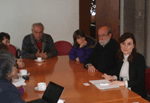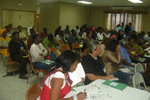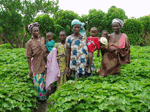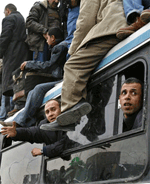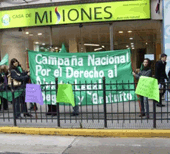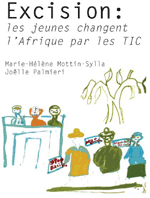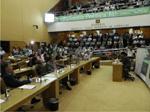Social Watch news
Published on Mon, 2011-08-29 07:29
Sources: CENDA, Radio Universidad de Chile. This week Chilean unions and social organizations made a report to the International Labour Organization (ILO) office in Santiago denouncing private sector pension funds for discrimination against women, a practice that had been documented in a study by the Centro de Estudios Nacionales de Desarrollo Alternativo (CENDA, the focal point of Social Watch in Chile). |
|
Published on Fri, 2011-08-26 07:44
Source: Civicus The World Alliance for Citizen Participation (CIVICUS) and the Arab NGO Network for Development (ANND, focal point of Social Watch) declared their full support for the peaceful protests and the legitimate demands of the Syrian people during the Special Session on Syria at the UN Human Rights Council this week. In a statement delivered to the UN in Geneva, CIVICUS and ANND condemned the criminal practices of the Syrian regime and called for the immediate end of the cycle of violence. |
|
Published on Fri, 2011-08-26 07:42
Source: The Star Fifty-four years after Merdeka (freedom from the Dutch colonial rule), Malaysia, like other developing countries, is still fighting for full independence in a globalised world which has grown more complex and crisis-laden, wrote Martin Khor, executive director of South Centre, in his most recent column for The Star, the leading newspapers of that country. Khor's column reads as follows: |
Published on Fri, 2011-08-26 07:37
Sources: Cumbre Mundial de los y las Afrodescendientes, El Telégrafo de Ecuador, AIM Digital, REL-UITA. Eight hundred representatives from organizations in 44 countries in America, Africa, Europe and Asia attended the first World Summit for People of African Descent, which was held in La Ceiba, Honduras. They called for the creation of a permanent forum for the affairs of people of African descent in the sphere the international community. The conference, which came to an end last Sunday, also resolved to set up "the International Coordination Committee of the World Summit for People of African Descent as a body to coordinate, monitor, mobilize, make proposals, organize and follow up on agreements and action, and to exert political influence” in the name of civil society organizations in these communities throughout the world. |
Published on Thu, 2011-08-25 07:23
Source: Third World Network As foreign capitals and hedge funds continue to make more forays into Africa's land resources, a study has unearthed some surprising findings about the identity of some of the principal investors, according to research by the US-based think-tank Oakland Institute. Swathes of land in Africa are being snapped up by investors and hedge funds, often at the expense of local inhabitants, with promises of benefits that may not materialise, wrote journalist Chee Yoke Heong, researcher with the Third World Network, in an article about the report published by Third World Resurgence. |
Published on Wed, 2011-08-24 08:51
Sources: Arabic Network for Human Rights Information, UN News Centre. Eleven Egyptian human rights organizations condemned this week the Israeli attacks against the civil population of Gaza and against Egyptian military personnel in the last days, and demanded that the U.N. Security Council conduct "a fair investigation" with the aim to "bring those responsible to trial". One of the signatory groups is the Egyptian Association for Community Participation Enhancement, focal point of Social Watch. |
Published on Tue, 2011-08-23 10:42
Sources:CELS, Misiones Online In Argentina, in the province of Misiones, 10 civil society organizations have accused the health system and the courts of failing to enforce the right to an abortion of a 14 year old girl who was raped. The child’s parents tried to obtain an abortion from the medical services and from the law courts, but they were met with delays and the case dragged on past the thirteenth week of pregnancy, and they have now withdrawn the petition they submitted to the courts. |
Published on Mon, 2011-08-22 07:29
Source: SlateAfrique, IDRC In the 10 years since the digital revolution got under way there have been more than 25 initiatives to fight female genital mutilation (FGM). The international campaign against this cruel practice, which is traditional in many parts of Africa, began 25 years ago but the spread of the new information and communication technologies (ICTs) in the continent has made it possible to raise real awareness about this problem among the general population. According to a study by Environnement et Développement du Tiers Monde (ENDA Tiers-Monde), member of the Senegalese group of Social Watch, this campaign originated among young people, who use these technologies the most. |
|
Published on Fri, 2011-08-19 08:10
Source: FIDH. The United Nations (UN) are under mounting pressure to create a commission of inquiry into war crimes and crimes against humanity commited by the Burmeses regime. A broad coalition of human rights organizations, including the Burma Lawyers' Counicil (BLC, national focal point of Social Watch) and the International Federation for Human Rights (FIDH), are focusing the pressure now on the European Union and specially on France. Those groups sent this month an open letter to the French President Nicolas Sarkozy and the Minister of Foreign and European Affaires, Alain Juppé, with copy to the Ambassador of France to Burma, Thierry Mathou. with that purpose. |
Published on Fri, 2011-08-19 08:08
Sources: INESC, Platform to Reform the Political System, Correio do Brasil. Last Tuesday a coalition of 30 Brazilian civil society organizations began collecting signatures for their Popular Initiative Proposal for Political Reform. If this project is successful it will facilitate citizen participation and monitoring in government matters, and also combat corruption in the organs of the State. |

